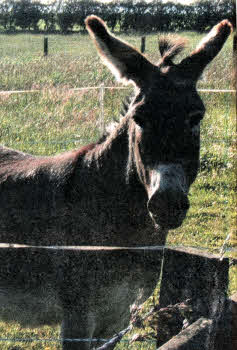
Granny's old remedies and donkey tales
THE DIGGER

This donkey grazes peacefully in the Craigantlet Hills outside Belfast. The donkey was used by previous generations for curing whooping-cough.
SOCIETIES, guilds and clubs associated with all walks of life provide social cohesion, a sense of belonging, fellowship and plain good "aul craic" for those who attend monthly meetings.
The Mothers' Union, formed in the 1870's, and the Women's Institute, formed in Canada in 1897 are two organisations of whom many ladies in the district are members.
A few years ago I was given access to one set of Women's Institute branch records for research purposes and in the pursuit of local history.
I was particularly drawn to the monthly competitions organised each month within the branch. There was no lack of imagination and ingenuity.
Each month a new challenge was set for those who wished to participate. In the early 1960's I noted a variety of unusual competitions — Best dressed wooden spoon, Best dressed milk bottle, best knitting on match sticks, floral arrangements in egg cups, a homemade article costing more than one shilling and the most original name for a guide-dog.
Recently I had the privilege to speak to a group of ladies at a local branch in relation to some aspects of local history.
Prior to the conclusion of the meeting I was asked to judge a number of exhibits on display that had been brought in for the evening's competition.
The subject matter that evening was "Granny's Old Remedies. It attracted in the region of twenty entries, mostly written anonymously on pieces of paper. There, were some interesting remedies to be found amongst the collection.
At this conjecture I will put in a disclaimer and state that none of the following remedies can be recommended.
It was most interesting to read in the competition entries how our forbearers deaite with minor ailments and complaints.
Potatoes were recommended as a cure for warts, wedding rings and teabags for a stye, and brown paper and red flannel for the chest.
A two pence piece was recommended for a bump to the head and apple
vinegar for varicose veins.
Vinegar was also used for stings and warts, and stale bread soaked in
vinegar was used to solve the problem of corns.
Aching muscles was soothed by horseradish and a bread poultice would
draw out infections.
Goose grease was used for treating sprains, bruises and burns.
Toothpaste was used to kill the pain of wasp and bee stings. The use of
a raw onion would have the same effect on these stings.
The cure for the whooping cough was a trip to the gasworks or being
passed under a donkey three times.
That might well have led to a trip to Lisburn's Bridge Street where the gas works were once situated.
I know one elderly gentleman who told me the story of his affliction with whooping cough as a young child over 80 years ago. He was taken to Bridge Street in the town, but it was not to the gasworks on that occasion.
There was in fact a donkey kept in that area of the town and he was passed under it three times.
On that occasion the cure failed to work. He survived and lived to tell the tale. However there was a story related in the Lisburn Herald in 1897 of a similar story.
The paper was reporting the plight of a 12 month old child who took ill with whooping cough. The mother, who was a widow, took her child to a local charmer. The infant was passed under a donkey and the charmer used some form of words described as an incantation.
The charm was complete when both the child and the donkey were given some food whilst the charmer went over his mystic words."
The child was taken home, but unfortunately the charm had failed to work and it died.
The use of a donkey in this way has been used for centuries.
In 1839 the English press were extremely critical of this charm and it was widely reported how an Irish labourer called Fegan had performed this ritual. On that occasion the animal was given a piece of hew bread each time the child was passed under it and the child had to kiss the donkey's nose three times.
It was reported that the father of the child muttered "some distinct words in the Irish language" and upwards of two hundred people had gathered and were engaged in "deafening yells.
The father of the child was reported to be confident that the child would be relieved of the disorder and the animal would contract it within 24 hours.
There were a couple of wise old words amongst "Granny's Old Remedies" that evening - "Prevention is better than the cure!"
This donkey grazes peacefully in the Craigantlet Hills outside Belfast. The donkey was used by previous generations for curing whooping-cough.
29/07/2011
